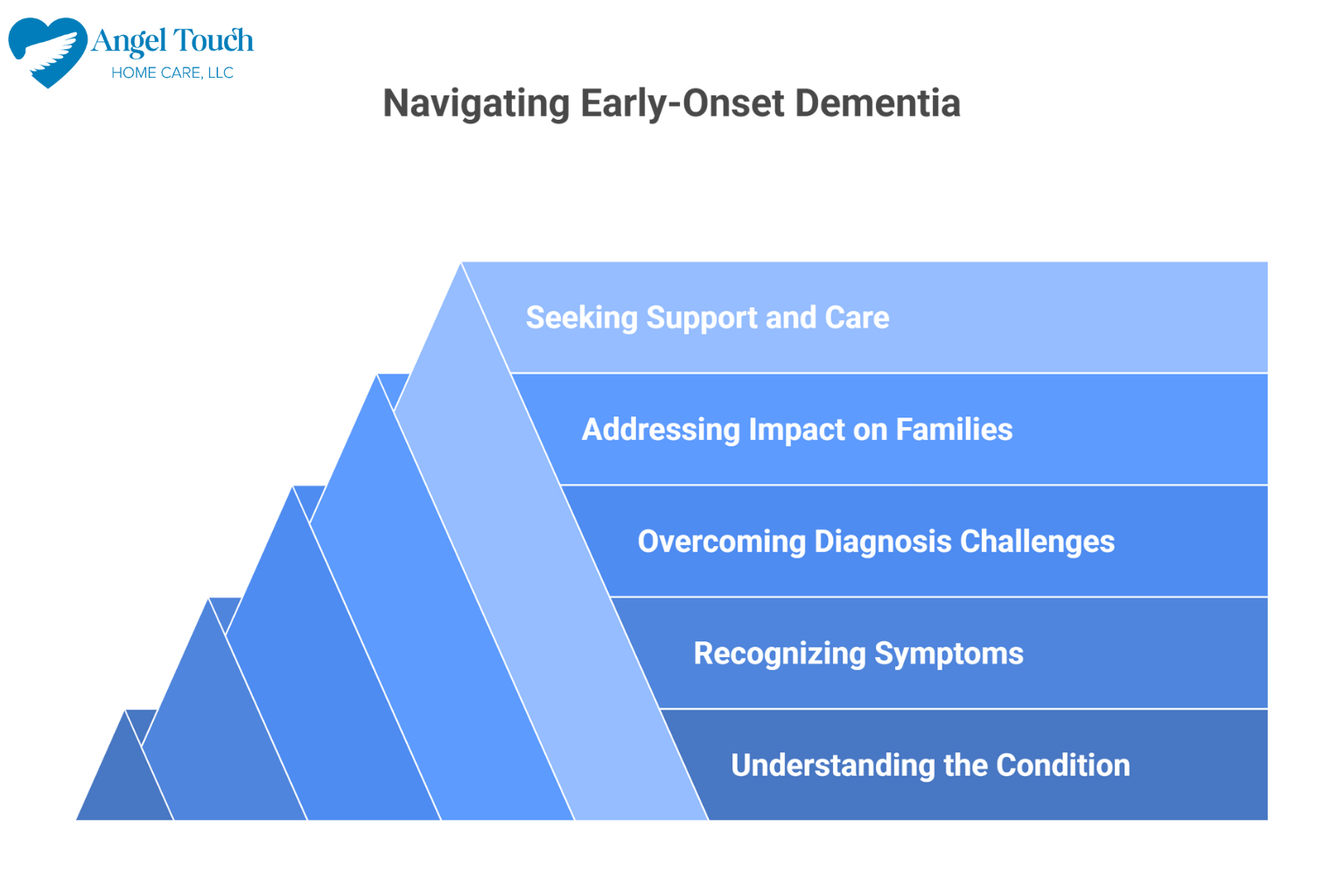Table of Content
Early-onset dementia is a condition that impacts individuals under the age of 65, often during the prime of their careers and family lives. While it shares symptoms with other forms of dementia, this specific type presents unique challenges and distinctions that demand attention and understanding.
Below, we’ll explore how early-onset dementia compares to more common forms of the condition, highlighting its causes, symptoms, diagnosis, and its impact on individuals and their loved ones.
Early-Onset Dementia Explained
Early-onset dementia develops in younger individuals, typically between the ages of 30 and 65. Unlike traditional dementia, which is more prevalent in older adults (65+), this condition can disrupt a person’s active work life, relationships, and social roles during their most productive years.
One key distinction is that early-onset dementia often goes misdiagnosed in its beginning stages because symptoms might initially seem like stress, anxiety, depression, or other non-dementia-related illnesses. This makes early detection difficult, which can delay essential support.
If your loved one has recently been diagnosed with dementia, now is the best time to plan for long-term care at home. The type of at-home care Boca Raton residents need can vary. Some need assistance a few hours a day, while others require more extensive around-the-clock assistance. At Angel Touch Home Care, we tailor our care plans based on each individual’s care needs, and the plans can be adjusted at any time. We are a trusted provider of respite and 24-hour care.
Causes of Early-Onset Dementia
Like other forms of dementia, early-onset dementia is driven by the degeneration of brain cells. However, the causes tend to vary and may differ slightly from age-associated dementia.
- Genetics – Certain hereditary conditions, such as Alzheimer’s disease and frontotemporal dementia, are contributors to early-onset cases. Genetic mutations like APOE-e4 increase risks.
- Lifestyle factors – Chronic conditions such as obesity, high blood pressure, or excessive alcohol use can contribute to the risk of developing early-onset dementia.
- Underlying medical conditions – Diseases such as Huntington’s, Parkinson’s, and multiple sclerosis may trigger symptoms in younger populations.
Though the causes are diverse, genetic factors have a more significant influence on early-onset dementia compared to common age-related dementia.
Symptoms that Set Early-Onset Dementia Apart
The symptoms of early-onset dementia often overlap with other forms but can manifest differently depending on a person’s age and circumstances. Key symptoms include:
- Cognitive decline – Memory loss, poor judgment, and difficulty with problem-solving are common but may be mistaken for work-related stress in younger individuals.
- Behavioral changes – Unlike traditional dementia, early-onset types such as frontotemporal dementia prominently involve drastic personality changes or social withdrawal.
- Physical symptoms – Some individuals may experience coordination issues, muscle weakness, or difficulty with speech alongside cognitive symptoms.
The life stage during which these symptoms emerge often amplifies their impact, as sufferers might still be active professionals or parents to young children.
Challenges in Diagnosis
Diagnosing early-onset dementia can be significantly more challenging than diagnosing older individuals. This is due to overlapping symptoms with other medical conditions and a general lack of awareness among healthcare professionals.
Common issues with diagnosis include:
- Misdiagnosis as stress or depression – Because the condition is rare in younger individuals, physicians may easily misattribute symptoms to mental health disorders or midlife crises.
- Extended diagnostic process – Individuals often undergo numerous tests, including brain scans, blood tests, and cognitive evaluations, before reaching a definitive diagnosis.
- Limited resources – Support networks and caregiving services targeted at younger individuals are often less available compared to the resources for older adults with dementia.
These challenges make early diagnosis and treatment essential to enhancing a person’s quality of life.
If your loved one has been diagnosed with a serious condition and needs help with tasks like meal prep, arranging transportation, bathing, and grooming, reach out to Angel Touch Home Care, a leading provider of homecare families can trust.
The Impact on Younger Individuals and Their Families
The ripple effects of early-onset dementia reach far beyond the individual. Families and caregivers often bear immense emotional and financial burdens.
- Career and financial pressures – Younger individuals may encounter job loss or the inability to continue working, which results in financial instability for their families.
- Caregiving challenges – Spouses, children, or parents of younger dementia patients often step into caregiving roles, which can strain familial relationships.
- Social stigma – Younger patients may feel isolated due to the perceived rarity of their condition, experiencing difficulty finding peer groups that understand their challenges.
For these reasons, building awareness about early-onset dementia can create opportunities to enhance resources, support systems, and awareness for those affected.
Caring for a loved one with early-onset dementia or another type of cognitive decline can be challenging for family members. Boca Raton respite care professionals can assist loved ones with a wide array of daily tasks, offering family caregivers the chance to focus on other personal responsibilities or take a break to prevent burnout. Whether it’s for a few hours a day or a few days a week, respite care is the perfect solution for family caregivers who are feeling overwhelmed. To talk to one of our friendly Care Managers and create a customized home care plan, call us today.









